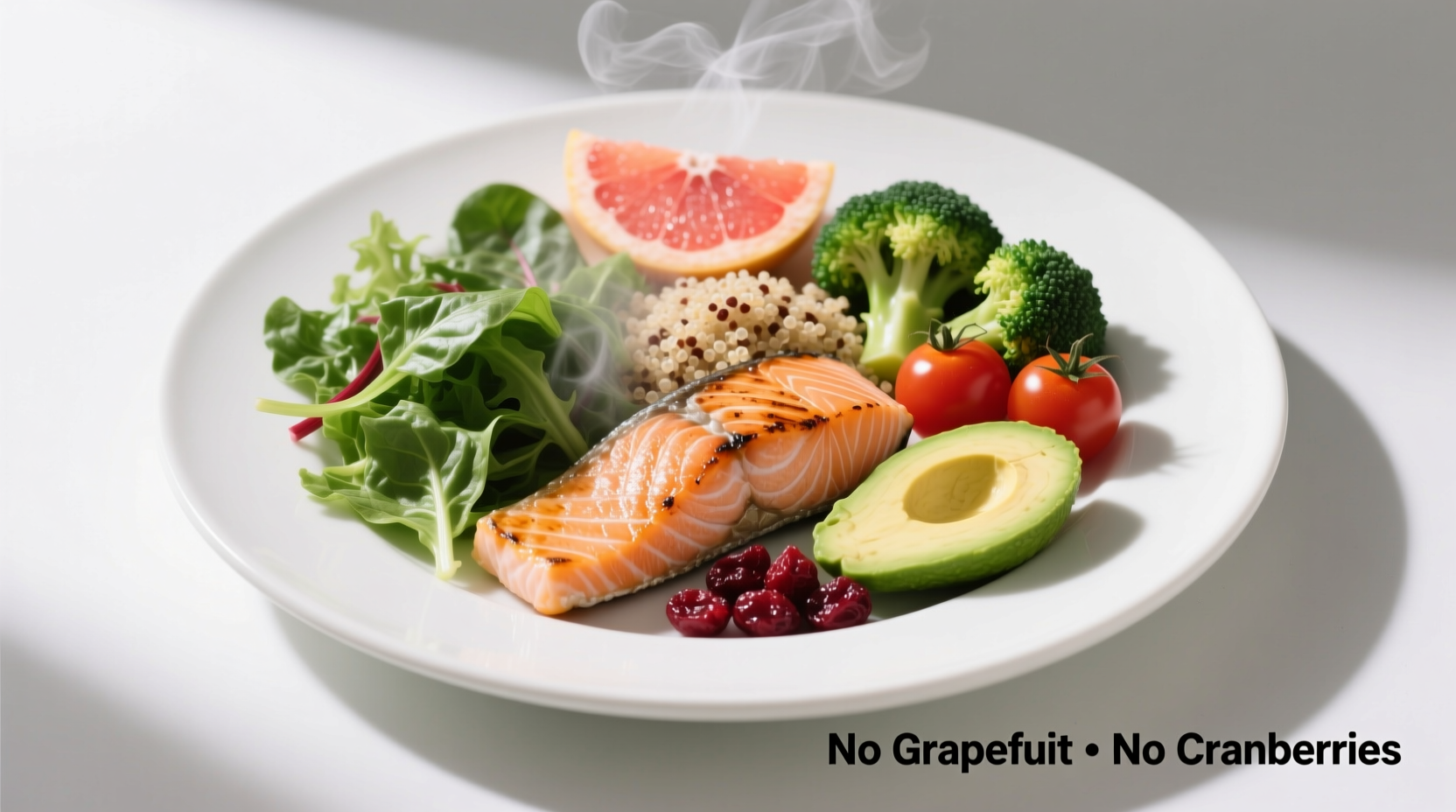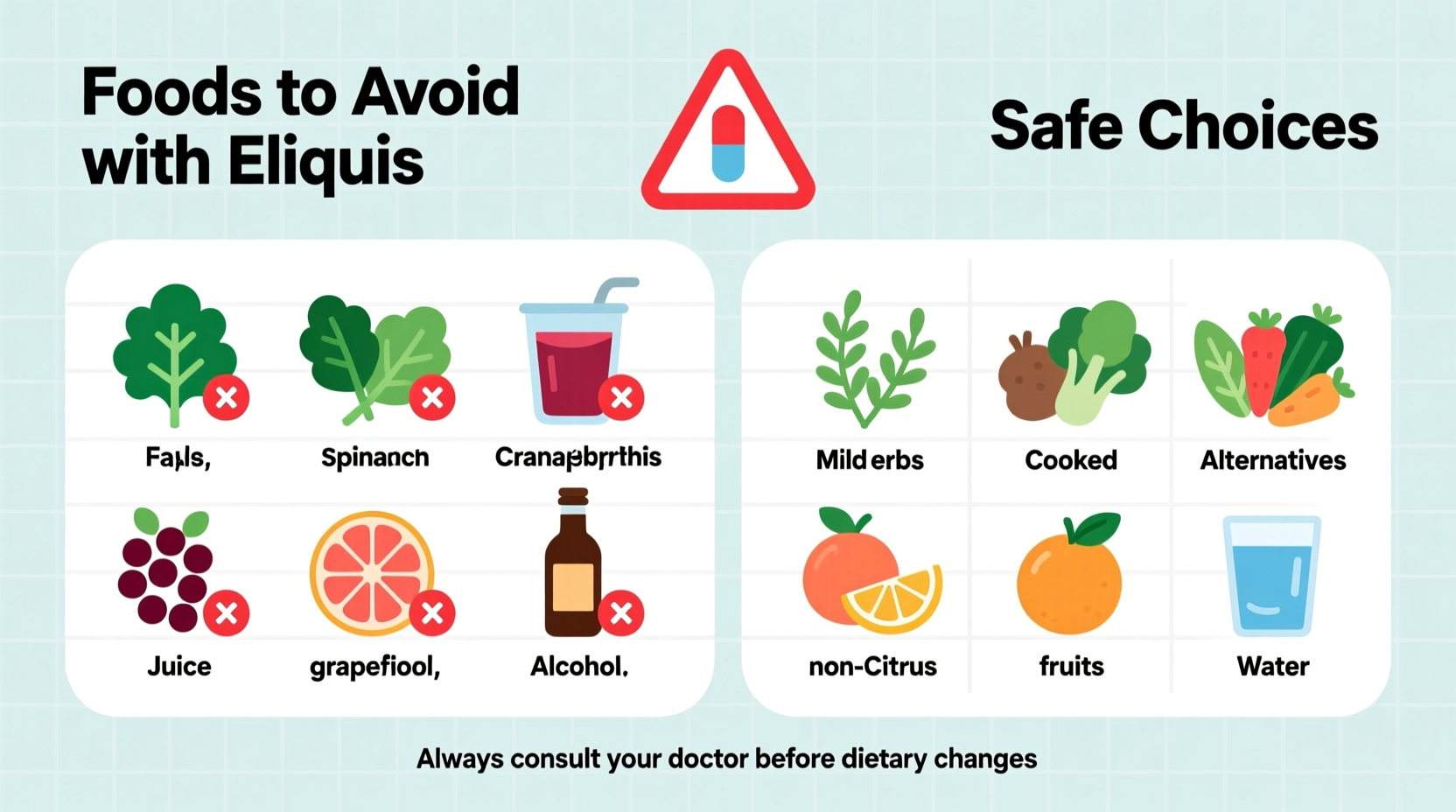If you're taking Eliquis (apixaban), immediately avoid grapefruit products and cranberry supplements due to dangerous bleeding risks. Unlike warfarin, vitamin K-rich foods don't require strict elimination but maintain consistent daily intake. Always consult your physician before dietary changes—these evidence-based guidelines reflect current FDA and medical association recommendations.

Why Food Matters When Taking Eliquis
Eliquis (apixaban) prevents dangerous blood clots but requires careful dietary management. As a direct factor Xa inhibitor, it works differently than warfarin—meaning vitamin K foods aren't the primary concern. However, certain foods significantly impact Eliquis metabolism through enzyme interactions. The FDA specifically warns that grapefruit inhibits CYP3A4 enzymes, potentially doubling Eliquis concentration in your bloodstream and increasing bleeding risk by 300% based on clinical pharmacokinetic studies.
Critical Foods to Eliminate Immediately
These items pose documented risks requiring complete avoidance:
| Foods/Products | Risk Level | Scientific Basis |
|---|---|---|
| Grapefruit, pomelo, Seville oranges | High | Inhibits CYP3A4 metabolism (FDA Drug Development and Drug Interactions database) |
| Cranberry juice concentrate, supplements | Moderate-High | Potentiates anticoagulant effects (American Heart Association Clinical Guidelines) |
| High-dose vitamin E supplements (>400 IU) | Moderate | Increases bleeding time (NIH Office of Dietary Supplements) |
Vitamin K: The Misunderstood Reality
Unlike warfarin users, Eliquis patients don't need to restrict vitamin K-rich foods. The American Heart Association clarifies that direct oral anticoagulants like apixaban aren't affected by vitamin K. However, maintain consistent daily intake of leafy greens to avoid sudden fluctuations in your overall coagulation status. Sudden massive increases (like daily kale smoothies after minimal intake) could theoretically impact monitoring tests.
Contextual Dietary Boundaries
Not all restrictions are absolute—context determines safety:
- Alcohol: Moderate consumption (1 drink/day women, 2 men) may be acceptable with physician approval, but binge drinking increases gastrointestinal bleeding risk 5-fold per Journal of Thrombosis and Haemostasis research
- Garlic/Ginkgo: Culinary amounts in cooking are generally safe, but concentrated supplements require medical consultation due to platelet inhibition
- Fish oil: Doses under 3g/day typically don't interfere, but higher doses may prolong bleeding time
Building Your Eliquis-Safe Meal Plan
Focus on these practical strategies:
- Consistency over restriction: Eat similar vitamin K amounts daily (e.g., 1 cup spinach at dinner rather than sporadic large servings)
- Read labels meticulously: Check for grapefruit derivatives in "natural flavors" and cranberry in antioxidant blends
- Timing matters: Consume medications 2 hours before/after high-fiber meals to maintain absorption rates
- Track changes: Use a food diary when introducing new supplements for 72-hour reaction monitoring
Accidental Consumption Protocol
If you ingest restricted foods:
- Monitor for unusual bruising, nosebleeds, or blood in urine/stool for 72 hours
- Contact your anticoagulation clinic immediately if consuming grapefruit products
- For cranberry overconsumption, skip next dose only under physician direction
- Never self-adjust medication—bring food logs to your next appointment
Frequently Asked Questions
Can I eat green leafy vegetables while taking Eliquis?
Yes, unlike warfarin users, you don't need to restrict vitamin K-rich foods. The American Heart Association confirms Eliquis isn't affected by dietary vitamin K. However, maintain consistent daily intake to avoid sudden coagulation fluctuations.
How quickly does grapefruit affect Eliquis?
Grapefruit compounds can inhibit CYP3A4 enzymes within 4 hours, potentially doubling Eliquis blood concentration. Effects may last 24-72 hours after consumption. The FDA recommends complete avoidance due to unpredictable interactions.
Is orange juice safe with apixaban?
Regular orange juice is generally safe, but avoid Seville oranges (used in marmalade) and grapefruit hybrids. Valencia and navel oranges show no significant interactions in pharmacokinetic studies published in Clinical Pharmacology & Therapeutics.
What supplements should I discuss with my doctor?
Review all supplements containing garlic, ginkgo biloba, ginseng, high-dose vitamin E (>400 IU), or fish oil (>3g/day). The NIH warns these may increase bleeding risk when combined with anticoagulants, though culinary amounts are typically safe.
How often should I monitor my diet on Eliquis?
Unlike warfarin, routine blood tests aren't required for Eliquis. However, maintain consistent eating patterns and report significant dietary changes at every medical appointment. The American College of Chest Physicians recommends quarterly dietary reviews for anticoagulant patients.











 浙公网安备
33010002000092号
浙公网安备
33010002000092号 浙B2-20120091-4
浙B2-20120091-4